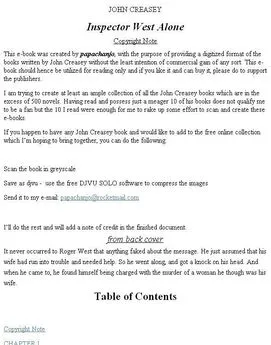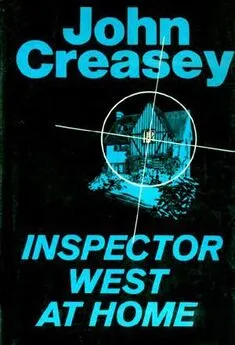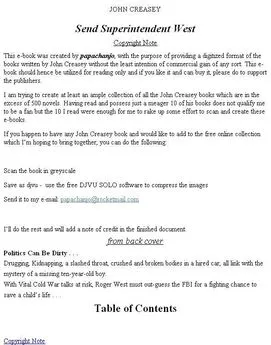John Creasey - Inspector West Alone
- Название:Inspector West Alone
- Автор:
- Жанр:
- Издательство:неизвестно
- Год:неизвестен
- ISBN:нет данных
- Рейтинг:
- Избранное:Добавить в избранное
-
Отзывы:
-
Ваша оценка:
John Creasey - Inspector West Alone краткое содержание
Inspector West Alone - читать онлайн бесплатно полную версию (весь текст целиком)
Интервал:
Закладка:
“I can’t stop the police making fools of themselves. I’m Charles Rayner. I’m in honest business, and I’ve a lot of work to do.” Roger stood up, but Sloan stayed in his chair, looking puzzled. Why?
Sloan said: “You’ll regret your attitude, Mr. Rayner.”
He got up and went out. Roger waited until the outer door closed, and heard a faint sound in the outer office. He saw the handle of the door turn, but Sloan didn’t come in, just left the door ajar and stood listening—an old trick, almost all tricks were old. Roger picked up the telephone and banged the cradle up and down, making the bell ring faintly. Sloan would feel himself to be on the verge of a triumph, expecting him to telephone an accomplice, ears strained for every word. Another temptation came; call the Yard, ask whether they had a Chief Inspector Sloan. This time, he succumbed. He dialled, and could imagine Sloan’s eyes bulging. A calm, familiar voice answered him, and the flood-gates of temptation opened wide again.
He had been a fool to do this.
“Scotland Yard, can I help you? . . . Can I help you?” As he didn’t answer at once, the man at the exchange spoke more sharply.
“Er—yes. Can you tell me whether you have an officer named Sloan—Chief Inspector Sloan?”
“We have Detective Inspector Sloan, sir.”
“Is he a tall, fresh-faced——”
“Who is that speaking, please?”
“My name is—oh, never mind.” He put back the receiver.
Here he was, at the end of a telephone which could connect him with the past which was to be drummed out of his mind. Lift the instrument and dial a familiar number, and Janet would answer. Janet—what would she do if she heard his voice?
Forget that! He could call Mark Lessing; a dozen, a hundred friends. Forget it!
He pushed the telephone away and lit a cigarette. His hand was unsteady, he had never felt more in need of a drink. He opened a cupboard in the big desk, and felt no surprise at sight of a whisky bottle, a set of glasses, and a soda syphon. He poured himself out a drink.
This was a pretty good start; whisky in the middle of the afternoon. And it wasn’t the only good start; plunged into an unfamiliar office, with no information, no knowledge even about himself as he was supposed to be; murderously attacked in mistake for Kennedy; accused of being Kennedy. Where was Kennedy? How much of Kyle’s story had been genuine? He pictured Kyle’s wife being crushed beneath a car; and Lucille, lying dead.
He began to go through the papers in the desk; routine, everything was routine. There were account books, order books, files of letters from customers, details of the business he handled; it could hardly be more varied. He lost himself in the task of studying it all. Charles Rayner had a flourishing business, and dealt in practically anything from tobacco and cigarettes to wines and spirits, tubular-steel chairs to plastic goods, bric-a-brac manufactured in Birmingham for sale in the bazaars of India and China—he had an export business as well as that at home, but apparently imported nothing. The business had been conducted from offices in Leadenhall Street; there were “change of address” cards which had been sent out to all customers; he was plunged into an established business, and much was explained by a stencilled circular letter:
Mr Samuel Wiseman begs to inform you that he has disposed of his business to Mr. Charles Rayner, and will remain with the firm for a short while in an advisory capacity. He takes pleasure in assuring you that Mr. Rayner will have personal charge of the business, and you may be, assured of his close attention to your special requirements at all times.
This letter was dated 1st March: two weeks before Lucille’s death. Had Kennedy been so sure of himself that he had planned that far ahead, or had he had another man in mind for “Charles Rayner” and thrust Roger into the position at the last moment? What were his real plans?
In a drawer of the desk, Roger found “his” passport; he leaned back as he glanced through it. As a Yard man, he knew that it was comparatively easy to obtain false passports, but this was a prime example; it had been used, had visa and customs stamps for the United States, several European countries, even Germany; and his photograph was unmistakable. He hadn’t even realized that he’d had one taken in his new personality, but here it was—a good likeness as passport photographs went. He hadn’t discovered any foreign correspondence; there must be some in one of the cabinets; if he worked hard he would find out where he had been.
The telephone bell rang.
Kennedy ?
Roger took the instrument off its cradle, hesitated, then put it to his ear. He schooled his voice, spoke with little movement of his lips.
“Hallo.”
“Roger!” His heart leapt at the name, for this was a woman. “Roger, please help me, I ——”
This was Marion—Marion, in trouble.
“What’s the matter?”
“I can’t tell you here, I must see you. I’ll be at Piccadilly, by Swan and Edgar’s in an hour. Please help me.”
“Marion, listen. I——”
But she’d gone.
* * * *
Roger stood outside Swan and Edgar’s, hub of London, watched the traffic and jingled the office keys in his pocket. He hardly noticed people, but every policeman in sight seemed to be twice life size.
Marion was a quarter of an hour late.
Half an hour——
It was no use waiting, she hadn’t been able to come.
He had grown fond of Marion, as one could grow fond of the only really friendly soul in one’s life. He had once had the opportunity to use her to help himself, and had missed it because he hadn’t trusted her.
Had it been a mistake to come here? And a mistake to talk to Kyle, a mistake to——
The male nurse appeared, short, flashily dressed in a loud blue suit and bright brown shoes and a spotted red-and-white bow tie. He strutted.
“Getting tired?” he asked.
“What do you want?”
“You, Mister Rayner. You’re wanted at the office. If I was you, I wouldn’t come away so easy in future.” He held up his arm, and a passing taxi stopped. “Inside.”
Roger obeyed. The male nurse gave the office address.
“What’s all this?” Roger demanded.
“You’ll find out.”
There were three traffic blocks; a ten-minute journey took them twenty minutes, and not another word was exchanged. The male nurse waited for him to start up the stairs. He went towards the office door, and the man said;
“Other side—that’s where you live.” He tossed Roger a key. Roger opened the door opposite the office, and stepped into a well-furnished, bright, and colourful sitting-room.
A radio was on, and Kennedy sat with his legs stretched out and his eyes closed, a dreamy expression on his face, listening to Brahms. The male nurse closed the door and then went out of this room into another. Kennedy kept his eyes closed, but as the music stopped, he said:
“So you had a visit from Ginger Kyle, did you?”
His manner was overbearing, even threatening. Revolt had to start some time.
Roger chose now.
CHAPTER XIII
REVOLT
AS he stared at Roger, Kennedy kept his eyes closed, or nearly closed. Roger strode across the room and switched off the radio, took out his cigarette-case, and lit up.
“I spoke to you,” said Kennedy, and opened his eyes wide; they burned as if at white heat.
“I heard you.”
“Then answer me.”
Roger said: “One of these days I’ll break your neck. Are you congenitally crazy? You let me come here without a briefing, easy meat for anyone who happened along. Kyle doesn’t matter, but Sloan does.”
“What did you say to Kyle?”
“Just now I’m asking the questions. Why didn’t you brief me properly? Or did you think I had a sixth sense? If I’d been able to tell Sloan all about the business, who I’d bought it from, what it was, he’d have gone away satisfied. Now he’s after me. He’s a bull-dog type. He’ll keep at me until he’s satisfied, and that probably won’t be for a long time. I thought you were supposed to be good.”
Throughout all this, Kennedy gradually sat up in his chair and drew in his legs. He didn’t blink, didn’t look away from Roger. The cigarette tasted unpleasant. He stood his ground, and Kennedy said softly:
“It was unavoidable.” Kennedy stood up. He had submitted to the first squall of revolt, which was a minor triumph. “I also had a visit from the police at my office.”
“So they’re after us both.”
“They’ve asked a few questions. You’ve got to find a way to stall them. That’s your job—understand, Rayner? That’s what you’re here for—countering the work of the police. You’d better do it well.”
“You bungled this. I should have been briefed before I got here. Your funny-funny business will get you to the gallows if you’re not careful.”
“You’ll come with me.”
“That’s why I’m worried about it.”
Kennedy smiled slowly.
“That’s a good frame of mind to be in,” he said. “I think I chose the right man. But watch your step. I’m the boss.”
“What I do, I’ll do my own way.” Roger went to a chair and sat down heavily—and flung out the next question: “What’s happened to Marion?”
“Why should you worry ?”
“She called me, asked me to——”
“Sure, I know. But you don’t answer appeals for help from pretty women, you go where I tell you to go, and forget all the rest.”
“Where is she?”
Kennedy leaned back and thrust his legs out again.
“She isn’t,” he said softly.
The significance of it was a long time dawning on Roger. It might not have dawned when it did but for that slow, cruel smile. “She isn’t.” Marion wasn’t alive, they’d killed her.
“She met with an accident,” Kennedy said.
“Accident?” On the tip of his tongue were the words: “Like Kyle’s wife,” but he bit on them. “So you——”
“That’s right. Haven’t you realized who you’re working for? Marion made it easier to handle you. But she wasn’t reliable. She fell in love with you. She listened at keyholes and learned this address and enough of the truth to be dangerous. She was silly enough to threaten to tell the police all she knew.”
Roger said: “Every detective in Scotland Yard could tell you what I’m going to tell you now. You’ve had it. You can get away with one murder, maybe two—but in your frame of mind, you go on until you get caught. You’re as good as hanged.”
“Very nice. I’ve been telling you, your job is to keep me free from the police.” Kennedy stood up and went to the window. This one overlooked the narrow street. “I don’t want to turn you into a yes man, you won’t be any good to me that way, but don’t forget who’s the boss, and don’t forget that if I get caught, you’ll be caught with me. I asked you what you said to Kyle.”
“How did you know about Sloan?”
“I’ll talk about a lot of things that mystify you, and you won’t say much I don’t get to hear. The question is—Kyle.”
“He was waiting when I got here. He expected to see someone else, although he didn’t say so. He pitched a hard-luck story, and I flung him out on his ear.”
“What kind of hard luck?”
“He wanted money. If I’d had time, I’d have listened to his story, but there wasn’t any time, because I wanted to be alone. I didn’t want anyone to find me with an old lag.”
“Who told you that Kyle was an old lag?”
Roger stared and laughed. He managed to sound amused. He lit another cigarette and waved his hand, as if at something which was ridiculous.
Читать дальшеИнтервал:
Закладка:










